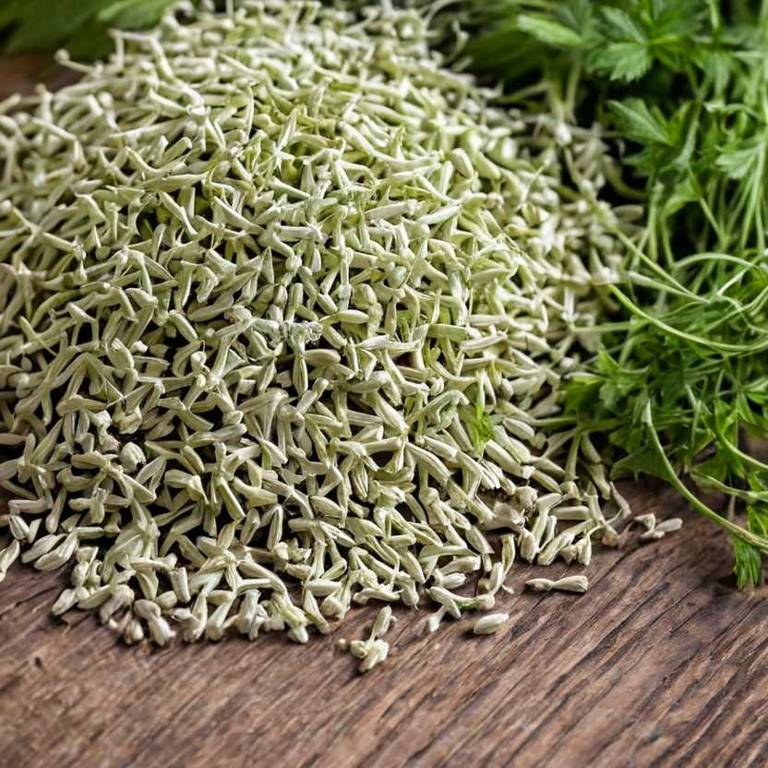By Leen Randell
Updated: Jul 20, 2024
10 Medicinal Constituents Of Trachyspermum Ammi (Ajwain)

Trachyspermum ammi has active constituents such as carvone, thymol, and borneol.
These compounds possess anti-inflammatory, antibacterial, and antispasmodic properties. They help in relieving digestive issues, such as bloating and gas, and provide quick relief from respiratory problems like bronchitis and asthma.
By improving digestion and reducing inflammation, ajwain can enhance the overall quality of life for individuals suffering from gastrointestinal and respiratory issues.
This article explains in details the 10 best active constituents of Trachyspermum ammi.
1. Carvone
Trachyspermum ammi carvone is a naturally occurring compound found in the seeds of the ajwain plant.
It belongs to the Apiaceae family and is commonly used in traditional medicine for its digestive and anti-inflammatory properties.
Carvone has been shown to exhibit antioxidant and antimicrobial activities, making it a potential therapeutic agent against various diseases.
2. Limonene
Trachyspermum ammi limonene is a bioactive compound extracted from the seeds of the plant.
It is a monoterpene hydrocarbon with a citrus-like aroma and flavor, often used in traditional medicine, food, and beverages due to its therapeutic properties.
Limonene has been shown to have antioxidant, anti-inflammatory, and antimicrobial effects, making it a promising ingredient for various applications, from health supplements to skincare products.
3. D-carveol
Trachyspermum ammi d-carveol is a bioactive compound derived from its essential oil.
It has been traditionally used in Ayurvedic and Unani medicine for its therapeutic properties. D-carveol exhibits significant antimicrobial, anti-inflammatory, and antioxidant activities, making it effective against various diseases.
Its potential applications include wound healing, digestive issues, and respiratory infections, highlighting the significance of d-carveol as a valuable bioactive compound from Trachyspermum ammi.
4. Pinene
Trachyspermum ammi pinene is a natural compound extracted from its essential oil.
It has been traditionally used in Ayurvedic medicine for its digestive and respiratory benefits. Pinene in Trachyspermum ammi exhibits anti-inflammatory properties, making it effective against various health issues such as bronchitis, coughs, and asthma.
Its antioxidant activity also helps protect the body from oxidative stress and free radical damage.
5. Α-pinene
Trachyspermum ammi α-pinene is a bioactive compound extracted from the seeds of this plant.
It is a monoterpene hydrocarbon that possesses significant therapeutic potential. α-Pinene has been studied for its antimicrobial, anti-inflammatory, and antioxidant properties, making it an effective treatment for various health issues such as respiratory infections, wounds, and skin conditions.
Additionally, it has shown promise in the prevention of oxidative stress and neurodegenerative diseases.
6. Γ-terpinene
Trachyspermum ammi γ-terpinene is a naturally occurring monoterpene compound found in its essential oil.
It has been studied for its potential therapeutic benefits, including antimicrobial, antioxidant, and anti-inflammatory activities. γ-Terpinene has also shown efficacy against various bacteria, viruses, and fungi, making it a promising natural alternative for treating infections.
Additionally, it has been reported to exhibit analgesic and sedative properties, suggesting potential applications in pain relief and anxiety treatment.
7. Β-phellandrene
Trachyspermum ammi β-phellandrene is a monoterpene compound found in its seeds.
It has been traditionally used in Ayurvedic and Unani medicine to treat various health issues, including digestive problems, respiratory disorders, and skin conditions.
β-Phellandrene has been shown to possess antimicrobial, antifungal, and insecticidal properties, making it a valuable component in herbal remedies for its potential therapeutic benefits.
8. P-cymene
Trachyspermum ammi p-cymene is a monoterpene hydrocarbon compound found in its seeds.
It is responsible for the characteristic aroma and flavor of ajwain oil, which is widely used in traditional medicine, food, and perfumery.
P-cymene has been studied for its antimicrobial, anti-inflammatory, and antioxidant properties, making it a popular ingredient in various applications.
9. Terpinen-4-ol
Trachyspermum ammi terpinen-4-ol is a bioactive compound extracted from the seeds of this plant.
It has been extensively studied for its medicinal properties and potential therapeutic applications. Terpinen-4-ol exhibits antimicrobial, anti-inflammatory, and antifungal activities, making it effective in treating various ailments such as skin infections, wounds, and respiratory disorders.
Its antioxidant properties also contribute to its ability to protect against cellular damage and oxidative stress.
10. Α-terpineol
Trachyspermum ammi α-terpineol is a monoterpene alcohol compound that is widely used in traditional medicine and aromatherapy.
It has been shown to possess antimicrobial, antifungal, and antioxidant properties, making it effective against various infections and diseases.
Additionally, α-terpineol is also known for its calming effects on the nervous system, promoting relaxation and reducing stress levels.